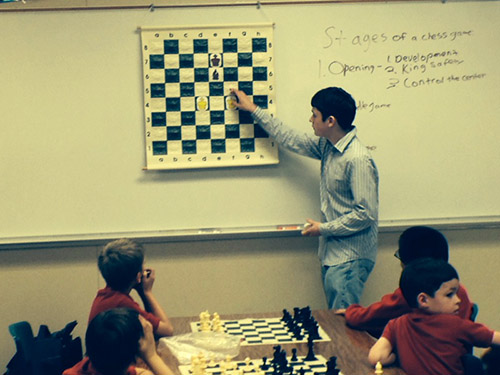
University of Arkansas Honors Fellow Alexander Wolf won the Under 2000 rating section of the Chess World Open Blitz Championship held in Washington, D.C., on July 6.
Wolf, of Fayetteville, will be a sophomore this fall. He is majoring in psychology in the J. William Fulbright College of Arts and Sciences.
To win the championship, Wolf won nine of 10 matches at the “speed chess” tournament that allows five minutes for each player to make all of their moves.
Wolf began the regular or “slow chess” World Open chess tournament on July 3, scoring 6 points out of a possible 9 (winning five matches, losing two and drawing two). With those 6 points, Wolf finished 26th out of 211 high-ranked competitors from around the world in the main chess tournament in which each player has up to 2.5 hours to make all their moves.
Wolf explained that a chess rating is a number between 0 and 3000 that estimates how good the chess player is.
“My rating going into the tournament was 1957,” he said. “To put into perspective, the World Chess Champion Magnus Carlsen has an international rating of about 2870.”
Wolf said his father, who is a University of Arkansas professor, taught him to play chess when he was 4 years old. His main competitors as a developing player were other D.C.-area kids until he was 10 years old and the adults and strong junior players in the Arkansas-Oklahoma-Missouri area once his family moved to Fayetteville eight years ago. Wolf also plays against fellow members of the Fayetteville Chess Club, which meets weekly at a local restaurant.
“I like that chess challenges you to think,” said Wolf, who estimated he plays eight to 10 hours a week, including online games. “You have to think logically but also abstractly. You have an opportunity to be creative because you are creating something new when you play your moves.”
Playing chess helped him develop math skills because of the way the board is mathematically ordered, Wolf said. He won the state chess championship all four years of his high school days.
Chess does have a reputation of being a difficult game, he said, but’s it possible to learn how to play in about an hour.
“You’re just beginning in terms of being on the road to mastering the game,” Wolf said. “There’s a saying in chess that it takes an hour to learn and a lifetime to master. Nobody plays perfectly.”
Players who want to be good know the importance of learning from others, he said.
“It is imperative for improving players to study the games of the greatest historical chess players, and I would say that most strong but not master-level chess players borrow significantly the successful ideas of past chess champions,” Wolf said.
Topics
Contacts
Heidi Wells, director of communications
College of Education and Health Professions
479-575-3138,